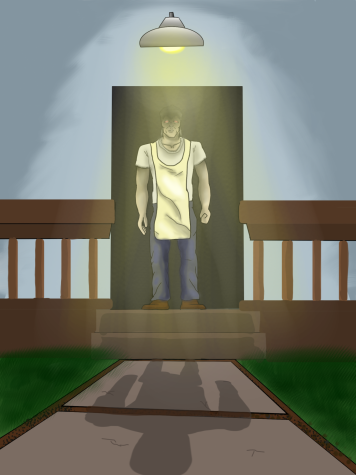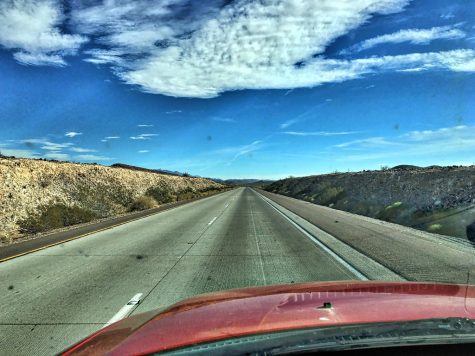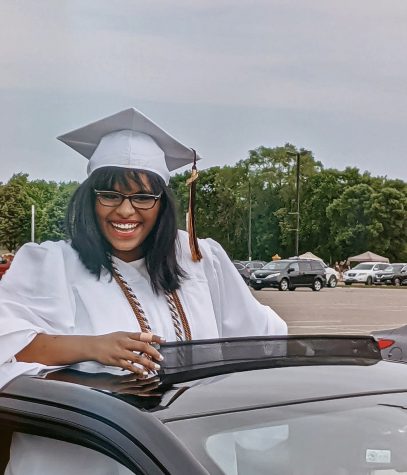Closer Towards Justice: Mending Broken Bonds
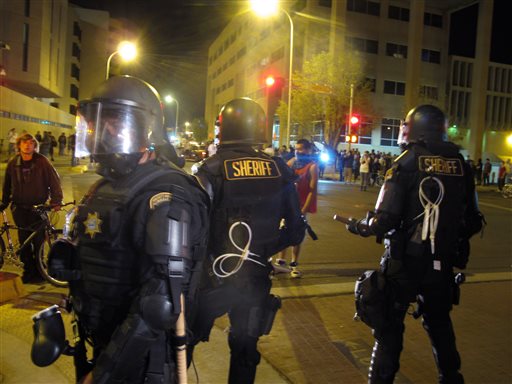
FILE- In this March 30, 2014 file photo, riot police stand guard near a crowd protesting police shootings in Albuquerque, N.M. As this city of 550,000 continues to see public demonstrations over a rash of police shootings, activists say they are looking to New Mexicos history of resistance and previous protests to draw attention to what they said are major problems within the police department. (AP Photo/Russell Contreras, File)
“I can’t breathe.”
As Eric Garner uttered these finals words on July 17, 2014, it formed into a rallying chant. The unbelievable situation that occurred to Garner in New York City was caught on tape, and after previously being confronted by police officers for distributing unlicensed cigarettes, he was pinned to the floor and suffocated to death.
According to the video footage, taken by Garner’s friend, he mildly resisted arrest while getting pinned by a few officers in a chokehold. Chokeholds have been banned entirely by the NYPD since 1993. Also, the lack of indictment for , one of the officer’s pinning Garner, only added more fuel to the fire. As cases similar to this became more publicized during the following years, protests increased.
Further south in Dallas, however, a police officer spoke his last words to his daughters saying, “What if this is the last time I’ll ever kiss you or hug you.” This ominous phrase was spoken by Sgt. Mike Smith before heading to a peaceful Black Lives Matter rally. Sgt. Smith, along with five other police officers, was caught in a shooting, as sniper Micah Xavier Johnson ambushed them in order to avenge African-American victims of police brutality. He was later killed with a remote-controlled bomb after escaping into a college campus.
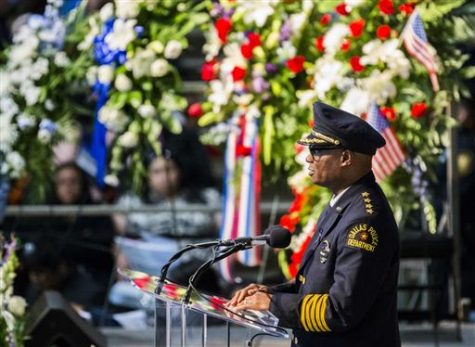
Dallas Police Chief David Brown speaks during funeral service for Dallas Police officer Patrick Zamarripa, one of the five officers killed on July 7th.
These cases, along with many others, are what resulted in a nation-dividing clamor as people struggle for understanding. The line between “us” and “them” begins to sharpen, becoming a double-edged sword, and individuals begin to generalize. This human tendency to chalk up the actions of one person to an entire group can be seen on both sides as either police officers or citizens experience a form of discrimination.
“It’s never good when somebody loses their life, whether it be a police officer or someone in the street we encounter,” says AVHS School Resource Officer Josh Gerving. “I know as a police officer the last thing that we want to do is be involved in a situation like that and take somebody’s life. And I hope that in my career as a police officer I won’t have to think or deal with something like that.”
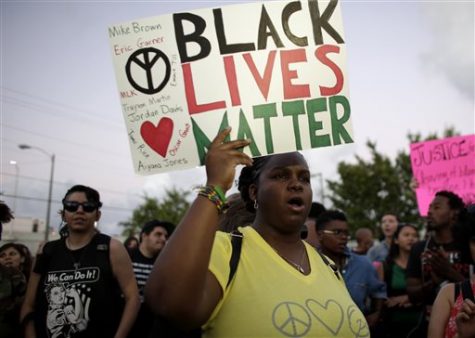
This divide in community has not only increased the stereotype of a hot tempered African American, but also nurtures a toxic amount of distrust between the people and the justice system.
Many police officers are experiencing an unfair prejudice, as they are viewed as the villain while also risking their lives to protect those who label them as such. “It has become a politically charged topic,” says AVHS teacher Jennifer Heineman, “but implicit bias exists and it is ridiculous to believe otherwise. In study after study we prove that much goes into what we see, and what we believe we perceive. Prejudice exists for everyone.”
Grouping the actions of one person with that of thousands of others can be seen as police officers commit misconduct by stereotyping a certain person, or by judging a police officer to be an inhumane person from previous cases. In order to bridge this gap between citizens and law enforcers, individuals and police departments must take action.
One solution that has been acted upon would be using the First Amendment to its fullest. In fact, many protesters have been rallying across the country. However, there have been cases of rallies turned sour, such was the unfortunate case for Sgt. Smith in Dallas.
Taking a creative route to dealing with the stress, millennials are using the recently popular #MannequinChallenge to share awareness. A particular video that has gone viral follows events that occur before and after a shooting while dictating the recent controversial topic regarding police misconduct on behalf of the Black Lives Matter organization.
“I think police should go into communities and make a good constructive relationship with the people they’re trying to protect,” says AVHS sophomore Mahamed Hassan.
Reaching out into the community might seem like a simple enough solution; however, it could make a world of difference.
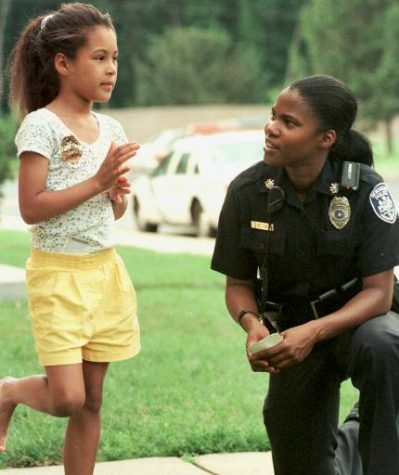
“One of the reasons I took this job is because I get to work with kids and I feel like I can learn from them just as much as they learn from me when I get chances to speak in classrooms,¨ says Gerving, “Being a police officer is a difficult job. We get put in situations on a daily basis that a lot of times the public only get to see if someone’s life is taken. The public doesn’t see those because something bad doesn’t happen.”
“I think a solution would be the training of police officers and community members in the use of non-complementary behavior,” says Heineman. “This means that if someone is acting with hatred towards you, your gut and social instinct says you should act with hatred towards them. Non-complementary behavior breaks that cycle and stops it from snowballing into something larger.”
Interestingly enough, programs that train against such implicit bias exist. It functions under the notion that each person holds a form of bias and that the consequences depend on our role in society. Thus, police departments are using these programs in order to avoid future corruption.
Another solution would be talking about the current situation. Although some Apple Valley High School students are not directly affected by these events, there is a lasting result that affects the majority in the form of stress. “It’s important to also seek out resources so that you can talk about what’s going on and see how we can help you,” says AVHS psychologist Michelle Thompson.
Overall, a cocktail of situations has occurred to further divide the United States of America; however, speaking of this situation and recognizing that it is not black and white – but very much grey – is important.



